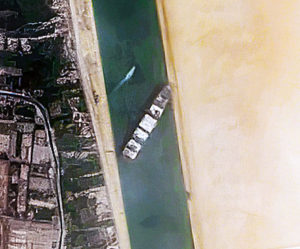I’ve been pondering – why hasn’t Israel capitalized on the highly beneficial opportunity to transport goods from the Mediterranean Sea to the Red Sea by building a railway?
Obviously, there’s the Suez Canal. The recent incident with the “Ever Given” (the container ship was grounded for a week; losses amounted to $10 billion per day) highlights the profitability of such a railway. Moreover, for certain types of cargo, a rail route would be far superior to the Suez – perishable goods, hazardous materials, diversification… in short, it makes sense.
Firstly, let’s list the reasons why the railway hasn’t been built yet:
- Geographical and infrastructural challenges: Constructing a railway through the Negev Desert is technically complex and may require significant investment.
- Political and strategic considerations: The Suez Canal is under Egyptian control, and creating an alternative route might have political ramifications in relations between the countries.
- Environmental concerns: Building a railway might impact the environment, especially in sensitive areas like the Negev Desert.
- Competition: Even if such a railway is established, it would still compete with the already well-established route through the Suez Canal.
Of these factors, the most pertinent in my view is the relationship with Egypt (which largely “controls” Gaza). Perhaps there are other factors (share your thoughts in the comments).
Now, let’s delve deeper into why building this railway is beneficial. Here’s what would make sense to transport on it (aside from tourists):
- Perishable goods: Food products, pharmaceuticals, and other goods requiring rapid delivery might be transported faster by rail than by sea through the Suez Canal.
- Valuable cargo: For expensive goods, such as electronics or precious metals, safety and speed might be decisive factors in choosing a route.
- Hazardous materials: Certain types of dangerous materials might require special transport conditions and are better suited for overland transport.
- Oversized or heavy cargo: Some oversized cargo might be too large even for specialized cargo ships; the Suez has restrictions on maximum draught and vessel width. Plus, railways offer more flexibility in splitting and combining different cargos, which can be convenient for some logistics tasks.
- Alternative during Suez Canal issues: The 2021 Ever Given incident… an alternative route for goods traveling between Europe and Asia emerges.
- Strategic transport: For certain states or companies looking to diversify their transport routes for strategic reasons, such a railway might be an attractive option.
I’ve come across mentions of plans to build the railway a few times over the past year since my repatriation. The previous government often talked about it. News mostly covered a high-speed railway for tourists, as the average person primarily thinks about how to spend their weekend, not about economic nuances 🙂 But of course, analysts considered all options.
Recently, in July, there was news that they are indeed going to build the railway – from Kiryat Shmona to Eilat. High-speed! The project has already been approved by the government:
- Initial budget: 100 billion shekels.
- Planned completion: 2040.
- Maximum train speed: up to 250 km/h.
- In addition to the railway, there’s a plan to build a metro in Gush Dan.
There might be a railway extension towards the Persian Gulf, connecting with Saudi Arabia and other countries. Israel is currently actively reconciling with the Saudis (not because of the railway, of course, but because the US is leaving the region to focus on domestic affairs).
It’s interesting why they’re not extending it from Ashdod (share your thoughts in the comments). Still, all in all, it’s good news. It’ll be fun to ride. Especially from the north (where I live) to the south… and I wonder how much the trip will cost… cheaper than a bus or not? Maybe it’ll even have a positive effect on prices in Israel. Time will tell 🙂

